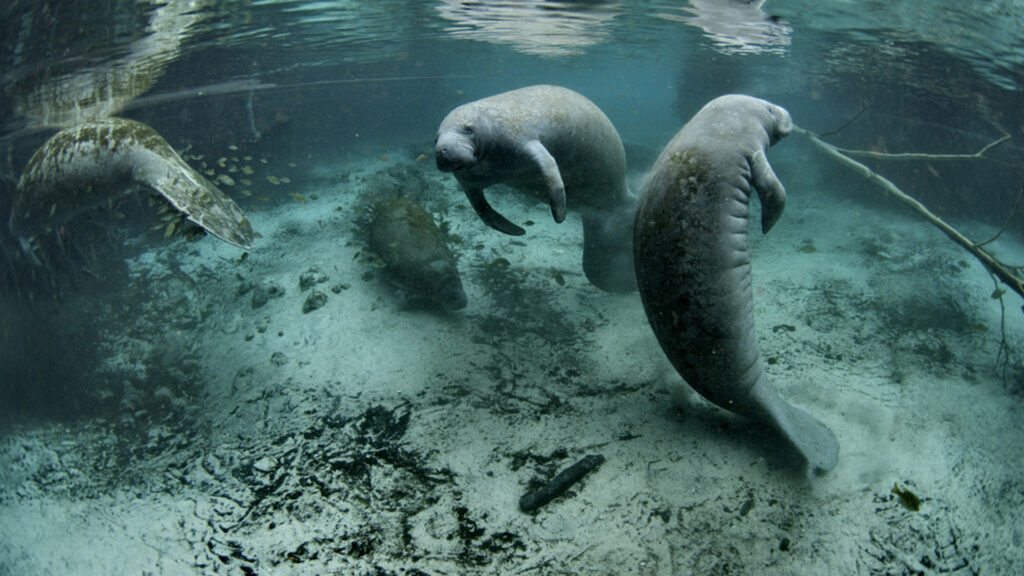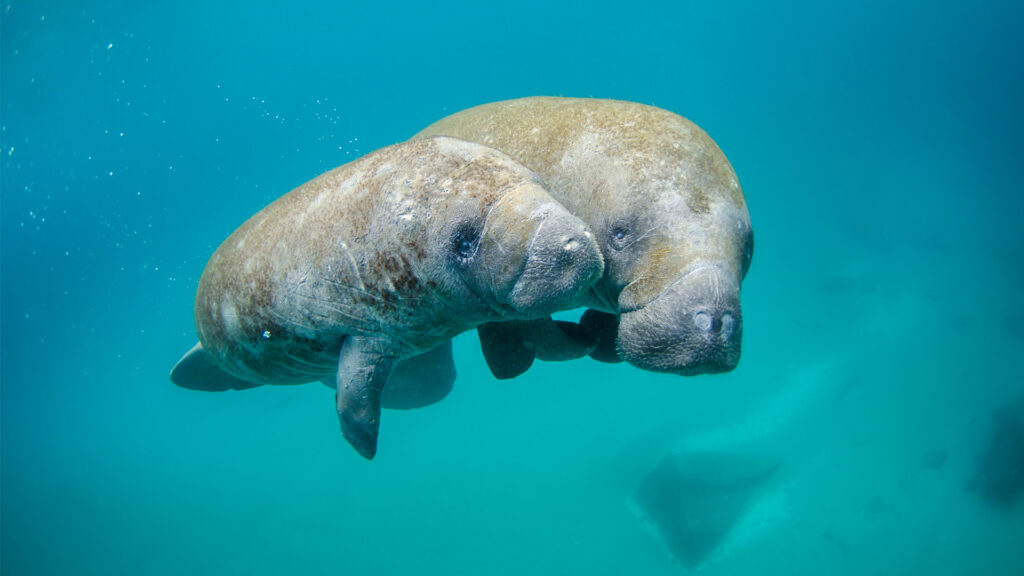By Elizabeth Fleming, Defenders of Wildlife
Manatee Appreciation Day is devoted to raising awareness about these fascinating aquatic mammals, which have existed in Florida for over 3 million years. That’s more than 200 times longer than humans have been in Florida.

A combination of hunting, habitat loss and deaths caused by collisions with boats led to manatees being listed under the Endangered Species Preservation Act, the predecessor to Endangered Species Act in 1967. Collisions with boats are still responsible for about 100 manatee deaths every year.
Manatees are also very susceptible to the cold and can experience cold stress at sustained temperatures below 68 degrees Fahrenheit. Unusually chilly winters caused by climate fluctuations, combined with a lack of natural warm-water habitat, has also led to manatee deaths. Manatees face major additional threats from hurricanes and climate change, entanglement in fishing gear, getting crushed in canal and waterway lock gates, lethal algal blooms and loss of essential seagrass habitat to feed on.
Since December 2020, the Florida manatee population has experienced an unprecedented loss of more than 2,000 manatees, or nearly one-quarter of the statewide population, raising concern among state and federal agencies about long-term impacts to the population. In 2021, 1,101 Florida manatee deaths were recorded (the deadliest year ever documented). In 2022, 800 manatee deaths were documented; and as of March 10, 163 animals have died in 2023, many of which are attributed to starvation due to loss of seagrass and other submerged aquatic vegetation. These losses threaten to unravel decades of progress for these vulnerable aquatic giants.
In July 2021, the U.S. Fish and Wildlife Service started a review to evaluate the manatee’s status. Considering the unprecedented levels of mortality over the last few years and given increasing coastal threats to manatees, such as harmful algal blooms that have led to vast losses of seagrass beds and climate-related changes, Defenders of Wildlife is working to ensure that state and federal agencies step up manatee conservation efforts to help the Florida population to recover.
What Defenders is doing

Defenders has prioritized Florida manatee conservation for nearly 50 years. Our work has been instrumental to the manatee’s progress toward recovery, helping the population grow steadily over the last several decades. Our manatee conservation program has three main objectives: 1) preserve, restore and expand essential connected habitat, 2) increase safe passage through dangerous waterways and 3) reduce harassment and disturbance. We also have a seat at the decision-making table to help develop and guide priorities for manatee recovery.
However, despite decades of steady growth in the population and a positive trajectory toward recovery, a convergence of threats and a lack of oversight and enforcement by state and federal agencies tasked with managing water quality in Florida threatens to undermine this progress. While we and other partners working to recover the Florida manatee have focused on addressing the most pressing threats, especially those imposed by boat collisions and loss of warm water, in recent years, loss of large expanses of vital food sources has emerged as a major new problem.
We can help manatees by conserving and restoring habitat, reducing pollution flowing into manatee habitat, reducing deaths from boat collisions and living responsibly with manatees.
How you can help
People can help through the following actions:
- Support efforts to secure, conserve and restore manatee habitat – contact elected officials and request they support meaningful funding for land and water conservation programs, such as the Florida Forever program.
- Tell regional, state and federal efforts to reduce nutrient pollution flowing into manatee habitat – contact elected officials and demand they reduce water pollution that is killing manatees and other wildlife.
- Endorse efforts to reduce manatee deaths from boat collisions through designation and enforcement of manatee protection speed zones and outreach (see our Help Protect Manatees card at www.defenders.org).
- Advocate for and contribute to official, scientifically sanctioned federal and state funding programs to help rescue and care for manatees, such as through the Fish and Wildlife Foundation of Florida’s marine mammal fund.
For more information see Defenders’ manatee webpage, defenders.org/wildlife/florida-manatee.
Elizabeth Fleming is senior Florida representative for Defenders of Wildlife.



